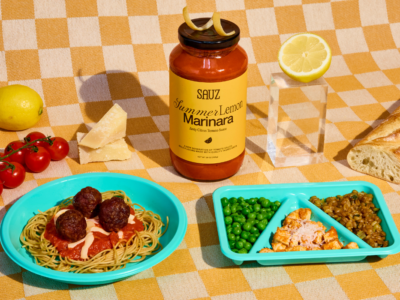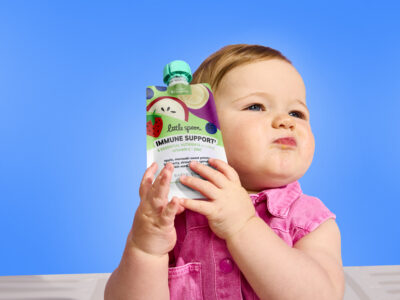Gut health is a hot topic in the wellness world, though we often think about it in relation to our own tummy’s, not our baby’s. We’re here to set the record straight about bacteria, gut health, biomes, and what this all means for your mini. Here are a few important facts to know about raising a (gut) healthy babe.
We’re all full of biomes
All guts (big and small) are full of microbiomes, which is the name we give to a group of living microorganisms like yeast, fungus, viruses, and bacteria in our body. Microbiomes actually help our body function properly and can be found in places like our mouth, skin, and of course, gut. In fact, about 1-2% of body mass in adults in made up of microorganisms. There’s actually one pound of bacteria in the human colon, so you can see how important these living organisms are to our health (1, 2).
Mom’s pregnancy cravings can impact baby health
According to published scientist and clinical nutritionist Anita Tee, a mother’s microbiome during pregnancy can have a role in fetal development. For example, an imbalanced ratio in mama’s biome can cause a similar imbalance in the baby, possibly leading to increased risk of asthma, allergy-related disease, and even obesity once the child is born (12, 13). But there are ways we can help out…
You can eat your way to a healthy gut
Simple diet changes can reduce the risk of infections and increased inflammation, so mom’s diet during pregnancy can impact baby’s microbiome. Generally, women who eat a higher fat diet (think saturated, processed, and trans—we’re not looking at you, avocado) while pregnant, may have babies with less of a healthy bacteria in their gut. This decrease in healthy bacteria can be associated with inflammatory conditions later in life. Pregnant women should focus on their nutrient intake and follow a diet that’s low in refined and processed sugars, white and processed carbs, and packaged foods. Opt for a rich variety of fruits and veggies (eat the rainbow!), whole grains, lean protein, healthy fats, and legumes.
Baby probiotics are a thing
Yes, you read that correctly. Your baby can take probiotics. The impact of Lactobacillus rhamnosus DSM 6594 (the probiotic strain used in Little Spoon’s Gut Feeling) on children is well studied and has been shown to help bodies better find and attack foreign invading pathogens that increase risk of illness. There’s still lots of research being done, so it’s best to consult with your child’s pediatrician before introducing any new probiotic. But if you’re ready to go the probiotic route, look no further than our Gut Feeling Booster. It has 3 billion CFU’s of Lactobacillus rhamnosus DSM 6594 while the recommended concentration is at least a billion CFU.
Dogs = healthy baby
Sounds crazy, right? There are actually some out-of-the-box ways to promote your baby’s gut health. Exposing your infant to furry animals, a variety of outdoor spaces, and other children in the first four months of life have been shown to positively influence microorganism diversity. Not to get too crazy, but you can also support diversity by preventing your baby from being overly clean and therefore exposing them to the new elements around them (22, 23).
We did the research so you don’t have to. Still, if you want to compare our stuff to the original, here are our sources:
References:
- National Institutes of Health. NIH Human Microbiome Project defines normal bacterial makeup of the body. 2012.
- Sender, R., et al. Revised Estimates for the Number of Human and Bacteria Cells in the Body. PLoS Biol. 2016 Aug; 14(8): e1002533.
- Willyard, C. Could baby’s first bacteria take root before birth? Nature 553, 264-266 (2018).
- D’Argenio V, Salvatore F. The role of the gut microbiome in the healthy adult status. Clin Chim Acta. 2015 Dec 7; 451(Pt A):97-102.
- Nuriel-Ohayon M, Neuman H, Koren O. Microbial Changes during Pregnancy, Birth, and Infancy. Front Microbiol. 2016; 7():1031.
- Neu J. The microbiome during pregnancy and early postnatal life. Semin Fetal Neonatal Med. 2016 Dec; 21(6):373-379.
- Saavedra JM, Dattilo AM. Early development of intestinal microbiota: implications for future health. Gastroenterol Clin North Am. 2012 Dec; 41(4):717-31.
- Mor G., Aldo P., Alvero A.B. The unique immunological and microbial aspects of pregnancy. Nat. Rev. Immunol. 2017;17:469–482.
- Mshvildadze M., Neu J., Shuster J., Theriaque D., Li N., Mai V. Intestinal microbialecology in premature infants assessed with non-culture-based techniques. J. Pediatr. 2010;156:20–25.
- rdissone AN, de la Cruz DM, Davis-Richardson AG, Rechcigl KT, Li N, Drew JC, Murgas-Torrazza R, Sharma R, Hudak ML, Triplett EW, Neu J. Meconium microbiome analysis identifies bacteria correlated with premature birth. PLoS One. 2014; 9(3):e90784.
- Tapiainen T, Paalanne N, Tejesvi MV, Koivusaari P, Korpela K, Pokka T, Salo J, Kaukola T, Pirttilä AM, Uhari M, Renko M. Maternal influence on the fetal microbiome in a population-based study of the first-pass meconium. Pediatr Res. 2018 Sep; 84(3):371-379.
- Chu DM, Antony KM, Ma J, Prince AL, Showalter L, Moller M, Aagaard KM. The early infant gut microbiome varies in association with a maternal high-fat diet. Genome Med. 2016 Aug 9; 8(1):77.
- Mor G, Aldo P, Alvero AB. The unique immunological and microbial aspects of pregnancy. Nat Rev Immunol. 2017 Aug; 17(8):469-482.
- Dominguez-Bello MG, Costello EK, Contreras M, Magris M, Hidalgo G, Fierer N, Knight R. Delivery mode shapes the acquisition and structure of the initial microbiota across multiple body habitats in newborns. Proc Natl Acad Sci U S A. 2010 Jun 29; 107(26):11971-5.
- Dominguez-Bello M.G. et al. Delivery mode shapes the acquisition and structure of the initial microbiota across multiple body habitats in newborns. Proc. Natl. Acad. Sci. USA. 2010; 107: 11971-11975.
- Backhed, F., et al. Dynamics and Stabilization of the Human Gut Microbiome during the First Year of Life. Cell Host Microbe. 2015 May 13;17(5):690-703.
- Zmora N, Zeevi D, Korem T, Segal E, Elinav E. Taking it Personally: Personalized Utilization of the Human Microbiome in Health and Disease. Cell Host Microbe. 2016 Jan 13; 19(1):12-20.
- Xe, R., et al. Maternal High Fat Diet Alters Gut Microbiota of Offspring and Exacerbates DSS-Induced Colitis in Adulthood. Front Immunol. 2018; 9: 2608.



